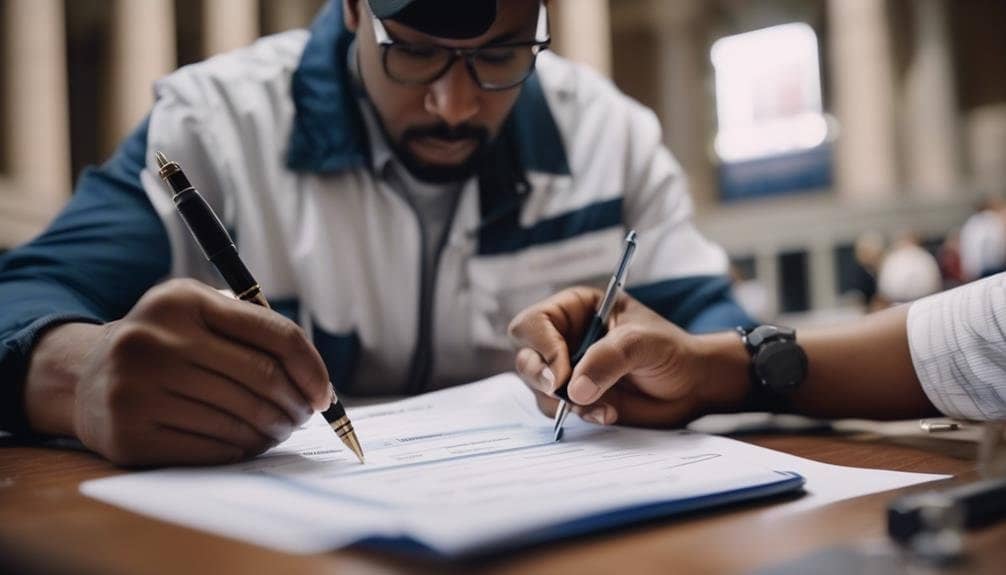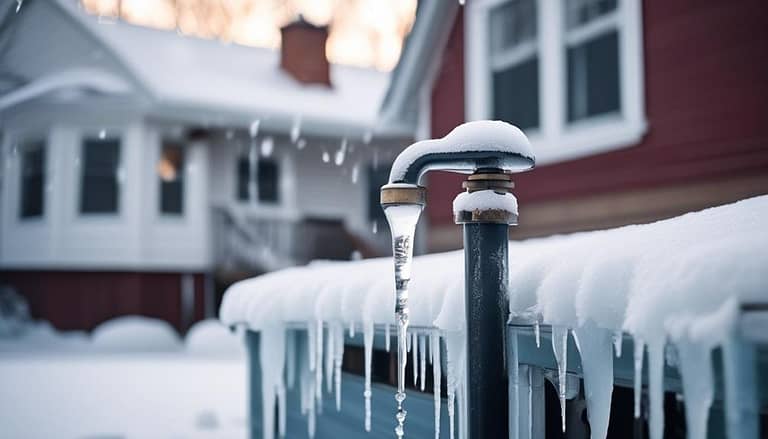Navigating Detroit Plumbing Permits
When you decided to renovate your bathroom in Detroit, you realized that getting a plumbing permit was a crucial step. Understanding the importance of compliance and the potential consequences of not obtaining the necessary permits is essential.
As you embark on this process, it's important to know the permit application process, the specific regulations for plumbing permits in Detroit, and the most common mistakes to avoid. Gaining a thorough understanding of these aspects will ensure a smooth and successful permit application experience.
The permit application process involves submitting the required documentation to the Detroit plumbing authority. Understanding the specific regulations for plumbing permits in Detroit is crucial to ensure compliance with local codes and standards. Common mistakes to avoid include missing deadlines and incomplete paperwork. By being aware of these aspects, you can navigate the world of Detroit plumbing permits with confidence.
Key Takeaways
Renovating your bathroom in Detroit? You'll need a plumbing permit. Not having the necessary permits can lead to consequences. To ensure a smooth application, understand the permit process, Detroit's plumbing regulations, and common mistakes to avoid. Submit the required documentation to the Detroit plumbing authority for the permit application. Compliance with local codes and standards is crucial. Watch out for missing deadlines and incomplete paperwork. With this knowledge, navigating Detroit plumbing permits will be a confident experience.
Importance of Plumbing Permits
Plumbing permits are essential for ensuring that plumbing work in Detroit complies with the 2009 Michigan Plumbing Code. By obtaining a permit, you commit to upholding these standards and contributing to the safety of the community.
The Young Municipal Center processes permit applications and ensures that the installation, maintenance, and alteration of plumbing systems adhere to the relevant codes and regulations.
Moreover, having a plumbing permit allows for timely inspections to ensure that the work meets necessary standards, providing peace of mind for homeowners and contractors and preventing potential issues.
It's crucial to recognize that obtaining a plumbing permit isn't only a legal requirement but also a proactive step in maintaining the quality and safety of plumbing systems.
When to Obtain a Permit
When starting most plumbing work in Detroit, it's necessary to obtain a plumbing permit to comply with regulations, except for certain repairs.
When planning plumbing projects involving alterations, replacements, or new installations, it's crucial to acquire the required permit.
The permit number and property address will be needed when scheduling a plumbing inspection.
In the case of hazardous or emergency plumbing work, you can even request same-day inspections if the request is made before 9:00 am.
It's important to note that a licensed plumbing contractor or a homeowner installing their own plumbing, under the supervision of a licensed master plumber, is responsible for obtaining the permit.
Once the plumbing work is completed, it must be approved, and a Certificate of Acceptance will be issued to the permit holder.
However, if there are any violations, a notice will be mailed within five business days.
Applying for a Permit
When starting a plumbing project in Detroit, the first essential step is to apply for a permit through the City of Detroit Buildings, Safety Engineering, and Environmental Department. You can get the application online or at the department's office. After completing all the required information, you can submit the permit in person or by mail with the necessary documents. Payment for the applicable fees should be submitted at the L&P Cashier station.
To simplify the process, here are the necessary steps:
- Obtain the Application: Get it online or at the department's office.
- Complete the Information: Fill out all required details.
- Submit the Permit: In person or by mail with necessary documents.
- Pay the Fees: At the L&P Cashier station.
- Await Approval: Once submitted, wait for permit approval.
Using clear and straightforward language, we aim to make the permit application process easier to understand and follow. These steps will guide you through the process smoothly.
Understanding Permit Regulations
Understanding permit regulations involves knowing the process for scheduling plumbing inspections and the required information for inspection requests to comply with the 2009 Michigan Plumbing Code.
When scheduling inspections, ensure you have all the necessary plumbing certification information, including the Certificate of Acceptance, Certificate of Plumbing Inspection, Certificate of Registration, and Certificate of Plumbing Re-Inspection.
To initiate the plumbing permit process in the City of Detroit, obtain the application, complete all required information, submit necessary documents, and pay applicable fees at the designated cashier station.
Remember, plumbing code information is crucial for proper installation of water, sewage, and drainage systems. Whether you're a licensed plumbing contractor or a homeowner installing your own plumbing, complying with permit regulations is a must.
Specific inspections such as storm drains, rough plumbing, water distribution, and final inspections need to be conducted in accordance with the regulations.
Additionally, the City of Detroit accepts payment for the required fees via credit card, offering convenience and flexibility in the permit process.
It's important to understand and adhere to these regulations to ensure the safety and functionality of plumbing systems.
Common Permit Mistakes
Understanding the permit regulations can help you avoid common mistakes when applying for plumbing permits in Detroit. To ensure a smooth permit application process, be mindful of these common permit mistakes:
- Providing an incorrect property address or permit number can lead to inspection delays and complications with the permit process.
- Failing to obtain necessary permits before starting plumbing work can result in violations and penalties, causing unnecessary setbacks and expenses.
- Not having a licensed plumbing contractor supervise the installation can lead to permit rejection, hindering the progress of your project.
- Inadequate or incorrect information on the permit application may result in processing delays, slowing down your project timeline.
- Neglecting to conduct required plumbing tests as per code can lead to failed inspections, causing disruptions in your work and potentially compromising the safety of water and air systems.
It's essential to be accurate with property addresses and permit numbers to avoid delays in inspections and permit processing. Obtaining necessary permits before starting plumbing work is crucial to prevent violations and penalties, which can lead to setbacks and additional expenses. Having a licensed plumbing contractor supervise the installation is important to avoid permit rejection and ensure the smooth progress of your project. Providing accurate information on the permit application is vital to avoid processing delays and maintain your project timeline. Conducting required plumbing tests as per code is necessary to prevent failed inspections, which can disrupt your work and compromise the safety of water and air systems.
Frequently Asked Questions
Can You Do Your Own Plumbing Work in Michigan?
Yes, you can do your own plumbing work in Michigan after obtaining the necessary permits and following the state plumbing code. It's important to comply with the 2009 Michigan Plumbing Code and schedule a plumbing inspection before starting any work to ensure everything is done correctly. This is crucial for the safety and functionality of your plumbing system. Using clear and straightforward language, it's essential to understand the regulations and requirements to avoid any potential issues. Additionally, incorporating specific examples and product recommendations, when needed, can further assist in completing the work effectively. By choosing active voice over passive, you can clarify your intentions and the necessary steps to take. Making sure to use transitions thoughtfully can help create a natural flow and understanding of the process.
Do You Need a Permit for Plumbing in California?
Yes, you must have a permit for plumbing in California. Whether you are a homeowner or a licensed plumbing contractor, obtaining the necessary permit is essential to comply with state plumbing codes and regulations. This ensures that the plumbing work meets the required standards and is safe for use. It is important to note that failure to obtain the proper permit can result in legal consequences and may lead to issues with insurance coverage in case of any plumbing-related incidents. Therefore, it is crucial to adhere to the permitting process to ensure the proper completion of plumbing projects and the safety of the property and its occupants.
What Requires a Plumbing Permit in Massachusetts?
In Massachusetts, getting a plumbing permit is necessary for any work that involves installing, changing, or fixing pipes, fixtures, or appliances. To obtain the permit, you need to fill out an application, provide required documents, and pay the fees. This permit ensures that the plumbing work meets safety and quality standards, protecting both your property and the community. It's essential to follow these regulations to avoid potential issues and ensure the proper functioning of your plumbing system. Transition: Therefore, always remember to obtain the necessary permit before starting any plumbing work.







